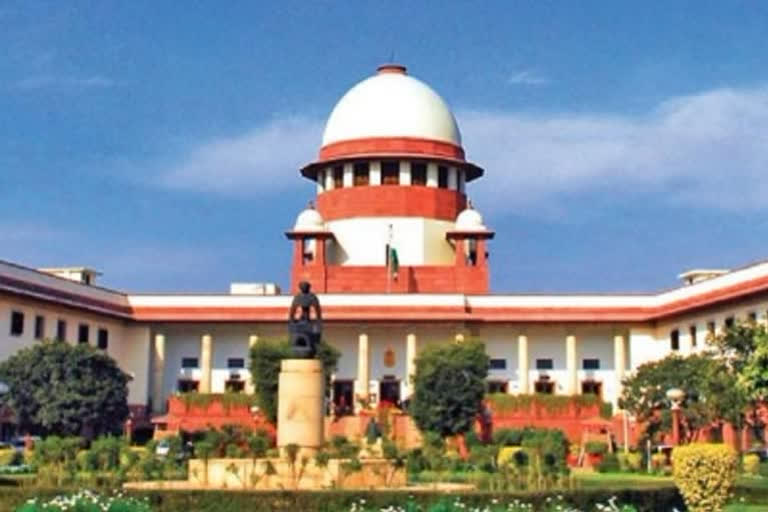New Delhi: The Central government has filed an affidavit in the Supreme Court on the suo motu case registered by the top court to check on pan-India issues over the pandemic during the second wave, and said that the production capacity of the COVID vaccines is being ramped up and expected to further increase in the next few months.
"The Government of India has made every effort possible to ensure that the people of India have access to safe and effective vaccines at the earliest," stated the affidavit, adding that two vaccines (Covishield and Covaxin) have been a part of the vaccination program since January 2021.
The affidavit also stated that another COVID-19 vaccine, Sputnik V developed by M/s Gamaleya Institute in Russia, has received Emergency Use Authorization by the DCGI, India in April 2021 and is now being administered in India. "In addition, some other domestic vaccines such as those from Biological E and Zydus Cadila are in the late stages of clinical trials and subject to the regulatory approvals, will further increase the availability of vaccines," the affidavit stated. It said that the production capacity of the vaccines under the vaccination drive is being ramped up as much as possible and as fast as possible and expected to further increase in the next few months.
Read: Delta Plus is more deadlier than Covid 19, know what this new variant is all about
"In order to further increase vaccine availability and incentivizing the foreign manufacturers, the regulatory process for use of foreign vaccines within India has been accelerated and simplified. It is submitted that the National Expert Group on Vaccine Administration of Covid-19 (NEGVAC), after comprehensive deliberations, recommended that vaccines for COVID-19, which have been developed and are being manufactured in foreign countries and which have been granted emergency approval for restricted use by the United States, European Union (EU), United Kingdom, Japan or which are listed in WHO (Emergency Use Listing) may be granted emergency use approval in India," the Central government said.
It said that this recommendation is a well-considered and unprecedented policy intervention, made in light of the global experience of these foreign vaccines which have now been administered to millions of individuals and have proven safety across populations of different ethnicities. This recommendation has been accepted by the Government of India, affidavit stated, further contending that simultaneously production of indigenous vaccine at other units is also an option which is being encouraged and facilitated on a war footing.
As pointed out in the earlier affidavit, due to the initial assistance provided for developing Covaxin, the Government has ensured a price of Rs 150 per dose for Covaxin as it is not possible to reduce the said price any further. This price is the lowest procurement price in the world.
The government also said that there was the reason of involving private hospitals in the process from the beginning of the vaccination programme so as to give wider reach to vaccination and lessen the stress on government facilities considering the very magnitude of the task ahead which is vaccinating second largest country in the world.
Read: Vaccinate prisoners and staff on priority basis: MHA
Any public health program - be it vaccination or otherwise, involvement of private hospitals is always found desirable and as per the statistics available, approximately, 55 per cent of the population of the country seeks and gets medical care/health services from private hospitals, and 45 per cent gets health care services from government hospitals, stated the affidavit.
It said that under the Revised Guidelines, the Government of India will procure vaccine and supply free of cost to the States/ UTs to vaccinate all persons above 18 years of age from June 21 and this will ensure that 18-44 years persons will also receive the free vaccine from Government Covid vaccination centres. Furthermore, all citizens irrespective of their financial status are entitled to a free vaccination, the affidavit added. Earlier, the top court had questioned the Centre's policy of arranging free COVID-19 vaccines for citizens above the age of 45, healthcare workers and frontline workers while asking those between the ages of 18-44 to pay for the vaccination.
The Central government in its affidavit submitted that as per the projected midyear population for 2020, the total population of the country aged 18 years and above is approximately 93-94 crore and as such, administering two doses to these beneficiaries would require an estimated 186 to 188 crore vaccine doses.
It was submitted that the vaccination drive would obviously get a boost if the Government of India succeeds in its attempts to procure vaccines available outside India such as vaccines of Pfizer, Johnson & Johnson, Moderna etc. Earlier, a two-judge Bench had formed a National Task Force to deal with the issues concerning oxygen supply, essential medicines distribution etc.
(ANI)



